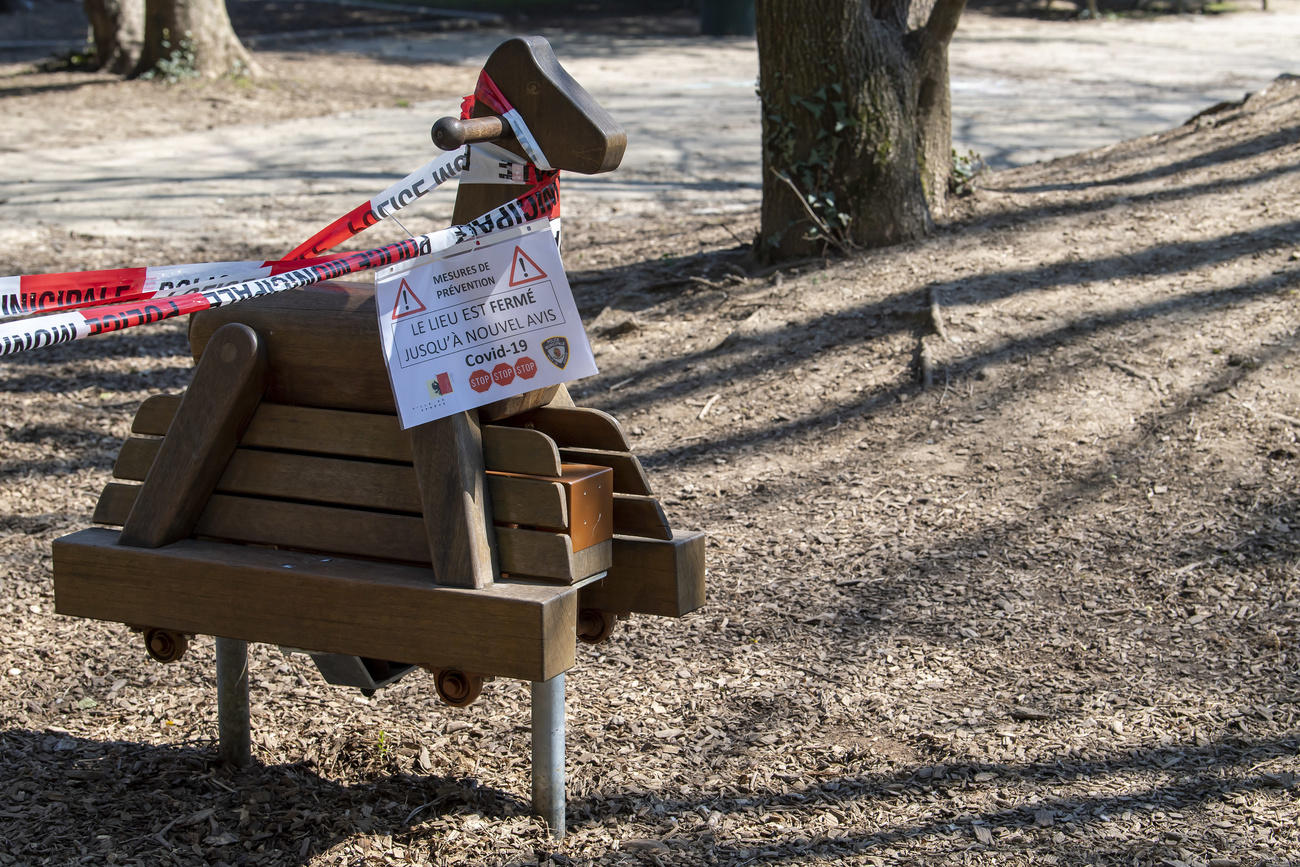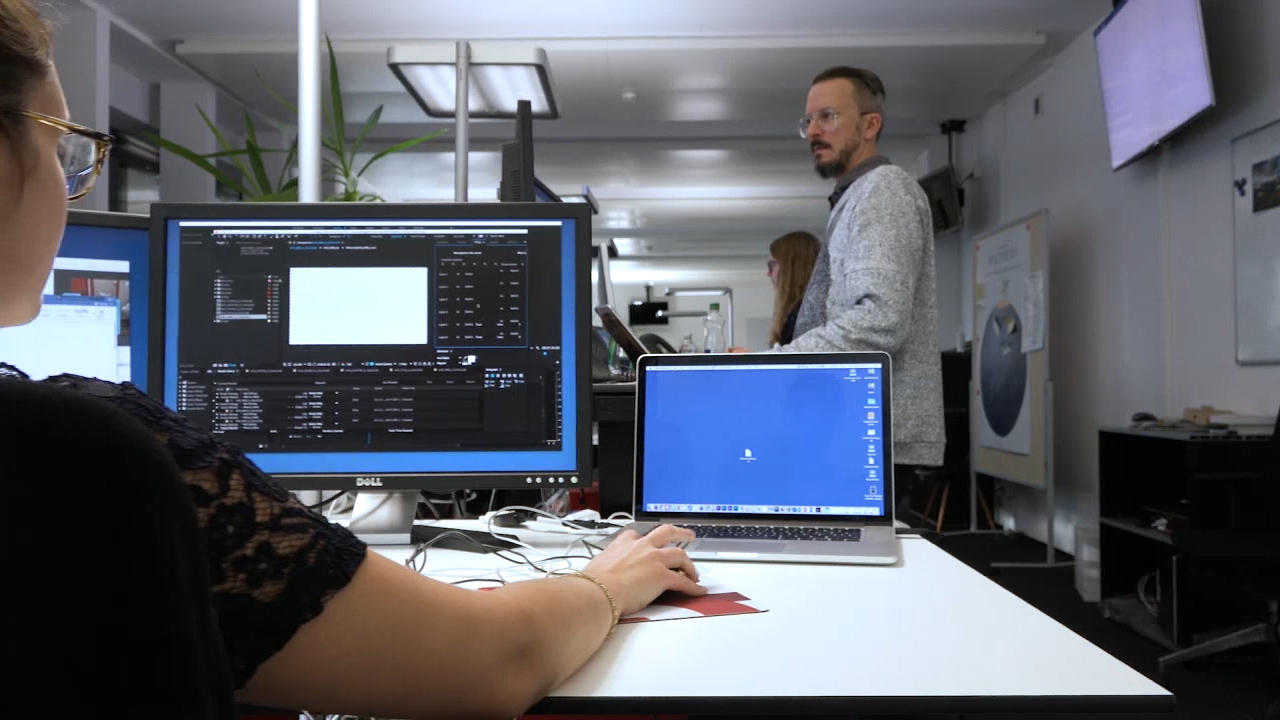
True or False: Children are not the drivers of the coronavirus pandemic

A claim by Switzerland’s head of infectious diseases that children are not the main vectors of Covid-19 has not stopped many parents from wondering if it really is safe to send their children back to school next month.
A day after the government announced the re-opening of primary schools, set for May 11, Daniel Koch clarified his position on the role played by children in transmitting the novel coronavirus.
“Children are most certainly not the drivers of this epidemic,” Koch, a key figure in the government’s response to the crisis, said on April 17.
“Of course, there are children who have been infected, mostly by their parents. But children are not vectors [and] are not really impacted [by the virus].”
This week Koch repeated these reassurances as several online petitionsExternal link against the return to school garnered thousands of signatures from worried parents and teachers.
The lack of ample data on the role children play in transmitting Covid-19 may be driving this uncertainty, as experts also appear divided on how to interpret emerging research in this area.
Fewer infections among children
In many countries, far fewer children than adults have tested positive for Covid-19. In Switzerland, people under 20 accounted for just 859 of the 28,100 positive casesExternal link registered by April 22 – roughly 3%. There are similarly low ratesExternal link of infection in the United States (2%), China, (2.2%), Italy (1.2%) and Spain (0.8%).

More
Fact checks by SWI swissinfo.ch: How we work
It is possible that cases are underreported, since children are less likely to experience symptoms – a study of over 2,000 minors with Covid-19 in China, for example, found that over 90%External link were asymptomatic or had mild symptoms – and many countries have not tested systematically for the virus.
Many countries have also reported fewer cases of children being hospitalised. Death from Covid-19 among children is rare. To date, no child under 20 has died from the virus in Switzerland. Experts are still trying to understand why the disease seems to be less severe in children.
The infection rates may be low, but according to some experts, this does not mean children are not susceptible to catching the virus.
In one analysisExternal link, scientists followed 391 people who contracted the virus in Shenzhen, southeastern China, along with nearly 1,300 of their close contacts, and found that 7%-8% of the contacts aged under 10 later tested positive – similar to the rate of adult infection.
Evidence is still emerging
Once children are infected, the next piece of the puzzle is knowing to what extent they transmit the disease. But since relatively few cases involve children, there is little data to rely on and little consensus among experts on the conclusions that can be drawn.
After analysing some 2,500 paediatric cases of Covid-19, many of which were mild or asymptomatic, the US Centers for Disease Control and Prevention (CDC) saidExternal link “patients with less serious illness and those without symptoms likely play an important role in disease transmission”. But the CDC also pointed out that its sample contained missing data.
More
The European Centre for Disease Prevention and Control is more cautiousExternal link, saying “there is still some uncertainty” about the role children play in transmission.
Daniel Koch said that his own statement was based on discussions with Swiss paediatricians specialising in infectiology.
One of them, Christoph Berger, toldExternal link the Neue Zürcher Zeitung: “There is some evidence to suggest that children and adolescents are not the main drivers of the Sars-CoV-2 pandemic.”
The case of a nine-year-old boy who contracted Covid-19 in the French Alps but did not transmit the disease, despite having contact with over 170 people, led experts who investigated his case to concludeExternal link that children probably don’t play an important role in virus transmission.
The child, who was also infected with the flu and a common cold at the time, had a low viral load – or few viral particles – in his body, along with mild symptoms. This low level of infection may explain why he did not infect people around him.
“It’s likely that this happens to many children,” Kostas Danis, one of the lead investigators, told swissinfo.ch. “They have fewer or milder symptoms, so they’re less likely to transmit the disease.”
Studies of family clusters also suggest that children are catching the virus from adults, who tend to be harder hit by the virus, Danis added.
School closures doing little to slow spread of virus
Despite the pushback in Switzerland and elsewhere in Europe against the re-opening of schools, closing them in the first place may not even have much effect on the spread of Covid-19. A team in the UKExternal link this month said that school closures have a greater impact on slowing the spread of viruses, such as influenza, that have a higher transmission rate in children than in adults.
And according to these researchers, the reverse appears to be true for the new coronavirus: children appear less likely to transmit the disease than adults, so school closures may actually be less effective in the current crisis than other measures, like social distancing.
“I don’t think we will see an increase in the number of cases because of the schools [re-opening],” said Danis, an epidemiologist at the French public health office. “The risk [of contracting the virus] is low – it would be higher in settings with more symptomatic adults.”
Verdict: Unproven
Exactly what role children play in transmitting the novel coronavirus remains one of the many unanswered questions of this crisis. Evidence is still emerging, but the existing data is leading some – though not all – experts to suggest that children appear less likely than adults to transmit the disease.

More
Coronavirus: the situation in Switzerland

In compliance with the JTI standards
More: SWI swissinfo.ch certified by the Journalism Trust Initiative
















![The four-metre-long painting "Sonntag der Bergbauern" [Sunday of the Mountain Farmers, 1923-24/26] had to be removed by a crane from the German Chancellery in Berlin for the exhibition in Bern.](https://www.swissinfo.ch/content/wp-content/uploads/sites/13/2025/12/01_Pressebild_KirchnerxKirchner.jpg?ver=cb688ed5)















You can find an overview of ongoing debates with our journalists here . Please join us!
If you want to start a conversation about a topic raised in this article or want to report factual errors, email us at english@swissinfo.ch.